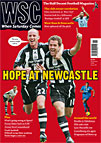 Scotland's troubles in Macedonia were not just on the pitch, says Kevin Donnelly
Scotland's troubles in Macedonia were not just on the pitch, says Kevin Donnelly
Any football fan who regularly travels home and away with their team will have faced the problem of lack of tickets for their respective end. The dilemma is whether to shrug your shoulders and accept it or go in the home section and sit on your hands, a choice made by approximately 1,500 Scotland fans for the game against Macedonia last month. The events around the World Cup qualifier in City Stadium in Skopje on September 6 raise a variety of questions over the official ticket distribution, stewarding of matches and the facilities that ought to be available for spectators in 35-degree heat.
The buying of home-end tickets by Scotland fans had worked without any problems on several occasions before this game, notably for the Euro 2008 qualifier in Paris last year. Macedonia would be different due to the local police chief insisting that no away fans would be allowed in the home end. At a meeting with the SFA security representative the night before the game, Scotland fans with a home-end ticket were advised to “wear a Macedonia T-shirt and shut up” if they wanted to get into the ground. Fair enough, but why, then, was the Macedonian FA still selling tickets to Scotland supporters on the day of the game when they had been party to the police chief’s decision the night before?
At the stadium, a complete lack of communication from the police led to Scotland fans being told they would be allowed in the away end, even when they had home-end tickets. A lack of proper stewarding then caused a bottleneck at the beginning of the security queue, which meant fans with legitimate away-end tickets struggled to get through. On reaching the correct gate, many in possession of a valid Scotland-end ticket were told they would not be allowed in as the away section was full. It appeared the stewards on the gate had been initially letting in Scotland fans with home-end tickets and when they reached the number they had allocated away tickets for, the gates were closed. A lucky few managed to get into the game some 20 minutes to half an hour after kick-off, having queued for more than an hour.
There were further bizarre scenes inside the ground. The facilities for the away fans included toilets that would not look out of place in the new Wembley but nothing else. In scorching temperatures and little or no shade, most fans quickly looked for a drink from a kiosk, but all that was available was water in the gents. With some having passed out due to the heat, at half-time a hose from a fire engine was provided to pump water into any available bottles or cups fans had brought with them. Eventually, stewards handed out bottles of water, but by this stage most travelling spectators were just wondering how the stadium had gained FIFA accreditation when the basic needs of fans were so blatantly disregarded.
As is ever the case, the Scottish Football Association have taken the brunt of the abuse from the fans and the media. The most bizarre accusation was that problems had been caused by the SFA’s unwillingness to pay for travelling fans to be accompanied by Rock Steady, a Scottish stewarding company who normally attend away matches. This is quite a claim given that the average Scotland fan has developed an extremely low opinion of Rock Steady stewards. The SFA, however, must take some responsibility for failing to have any officials outside the ground after the kick-off, when the bulk of the problems occurred for fans holding valid tickets.
The bad memories of Skopje were quickly removed by the warm welcome from the locals in Iceland the following Wednesday, where supporters mingled freely in various part of the ground. This served to demonstrate that fans can still travel and take their chances where necessary. Nonetheless, the events in Skopje will have caused some to reconsider following Scotland abroad without a ticket.
From WSC 261 November 2008